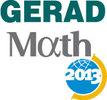HEC Montréal, Canada, 6 - 8 mai 2013
Journées de l'optimisation 2013
HEC Montréal, Canada, 6 — 8 mai 2013

TA5 Optimisation sans derivées III : applications / Derivative-Free Optimization III: Applications
7 mai 2013 10h30 – 12h10
Salle: CPA du Québec
Présidée par Dominique Cartier
4 présentations
-
 10h30 - 10h55
10h30 - 10h55Challenges in Optimal and Sustainable Water Allocation for Berry Farming
We present results and challenges in seeking to meet a sustainable water yield while maximizing profit and demand via derivative-free constrained optimization. The goal is a coupled hydrological decision-making tool using modeling, simulation, and optimization to understand trade-offs and guide practitioners that is flexible and applicable across various agricultural regions.
-
 10h55 - 11h20
10h55 - 11h20Application of Black Box Optimization for Flood Control and Hydropower Production
The Kemano Hydropower System is located in British Columbia and is operated by Rio Tinto Alcan. Many challenges arise while operating with this system such as: supply the load from the Aluminium Smelter, flood control, dam protection and other environmental constraints. A Stochastic Dynamic Programming Controller is used to tackle these problems. As all the constraints cannot be satisfied, a black box optimization technique is used. It calibrates the controller so that the probabilities of constraint violations, when simulate by it on the historical scenarios, are under the decision maker criteria’s.
-
 11h20 - 11h45
11h20 - 11h45New Approach for the Optimization of a Hydrologic Model with the MADS Algorithm
Hydrologic models are employed to model the water cycle through parameterized equations to estimate flows at the outlet of a watershed. Two optimization strategies oriented on physical processes are compared to the method currently used at Hydro-Québec, based on the robustness of the parameterization in the context of climate changes.
-
 11h45 - 12h10
11h45 - 12h10Alternatives for Optimization in Systems and Control: Convex and Non-Convex Approaches
In this presentation, we will develop a short overview of main trends of optimization in systems and control, and from there outline some new perspectives emerging today. More specifically, we will focus on the current situation, where it is clear that convex and Linear Matrix Inequality (LMI) methods have become the most common option. However, because of its vast success, the convex approach is often the only direction considered, despite the underlying problem is non-convex and that other optimization methods specifically equipped to handle such problems should have been used instead. We will present key points on this topic, and as a side result we will propose a method to produce a virtually infinite number of papers.

